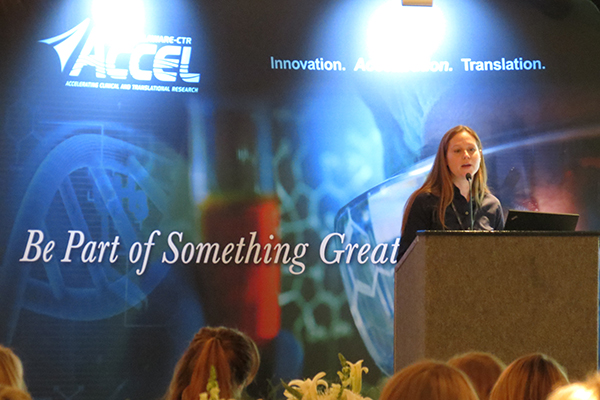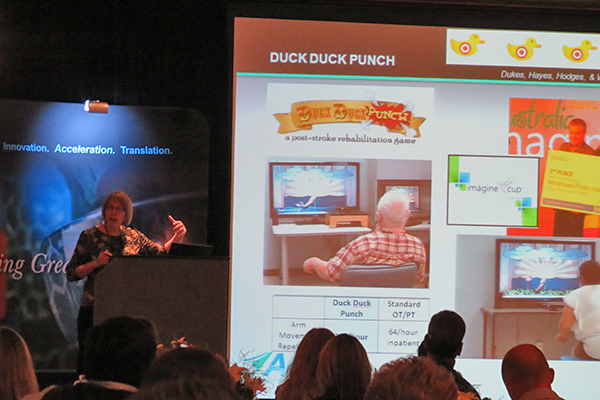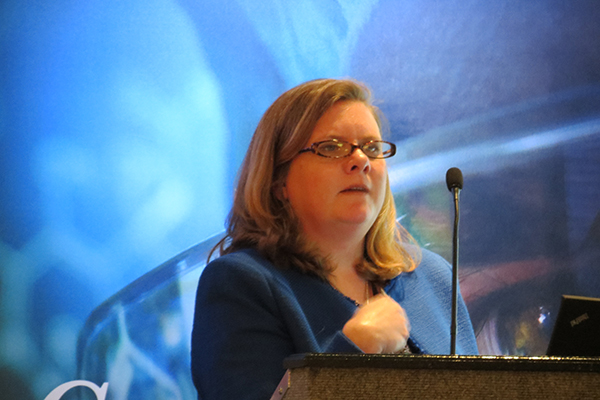


A strong partnership
Delaware-CTR ACCEL program meeting features talks, networking
12:45 p.m., March 11, 2014--After Megan Wenner finished giving her research talk, a buzz ran through the room. The new University of Delaware assistant professor of kinesiology and applied physiology is studying the link between female hormones and cardiovascular function and others were eager to speak with her.
Those “others” were attendees of the first of meetings the Delaware-CTR ACCEL plans to hold annually. The gathering was held March 9-11 at the Mendenhall Inn in Chadds Ford, Pa., and about 150 people were present Monday for a full day of talks, networking and workshops.
Research Stories
Chronic wounds
Prof. Heck's legacy
CTR stands for Clinical and Translational Research and ACCEL refers to the aim of the new program, which is to advance biomedical research in Delaware from the lab to the bedside.
It launched last year with a $20 million Institutional Development Award (IDeA) grant from the National Institutes of Health, augmented by $5 million from the state and another $3.3 million in matching funds from the four institutions participating: the University of Delaware, Nemours/Alfred I. duPont Hospital for Children, Christiana Care Health System and the Medical University of South Carolina.
The three Delaware institutions have been engaged in a strong biomedical research partnership for more than a decade, under the Delaware INBRE program, which has been supported by over $140 million in awards from IDeA. The IDeA program provides critical funding to build research capacity in states with traditionally low levels of NIH funding.
In very few of the 23 IDeA states does funding support clinical or translational research.
“It’s really very exciting,” said Vicky Funanage, Nemours director of biomedical research and member of ACCEL’s internal advisory committee. “This could be transformative.”
The partnership with the Medical University of South Carolina -- a leader in clinical and translational research -- is new through ACCEL and will allow both states to enhance their research programs. It also ties the two IDeA states together.
At Monday’s meeting, biomedical scientists, doctors, nurses, public health officials, community health workers and more came together to share ideas. Funanage said an immediate focus of ACCEL is to continue to work on breaking down barriers, to help the four institutions to work together.
For instance, Nemours is currently recruiting a director of neuro orthopedic research and Funanage and the administrative team continue to solicit feedback on how to enable ACCEL members to work among sister institutions, how to address multi-institutional human subjects research and how to coordinate budgets.
Delaware INBRE, which stands for IDeA Networks of Biomedical Research Excellence, helped provide a platform from which to launch ACCEL, Funanage said, particularly now that the program is housed on UD’s Science, Technology and Advanced Research (STAR) Campus.
And, the Delaware Health Sciences Alliance (DHSA) has helped contribute to the state’s cohesive network of researchers and partners.
“The IDeA grant gave us the opportunity to capitalize on programs that already were in place,” Funanage said.
What sets ACCEL apart is its commitment to taking what’s happening in laboratories and translating it to the real world.
“Especially because we’re an IDeA state, people want to know, how does this make a difference in my life,” said Kathy Matt, dean of UD’s College of Health Sciences and DHSA executive director.
Matt and Funanage noted that researchers across the state that once worked in silos are now sharing their ideas and enhancing Delaware’s biomedical landscape.
“It’s about bringing people in to work together, to use their individual abilities to advance clinical and translational research,” said Michael Peterson, ACCEL’s director of communications.
Peterson believes humility and charity are critical for ACCEL’s core mission, and that scientists and the public need to work together to see it through.
“A program is just a program unless the people involved feel they are part of something bigger than themselves,” said Peterson.
In fact, that’s ACCEL’s tagline: Be a part of something great.
For Jennifer Sims-Mourtada, one of eight early career researchers to receive pilot project grant funding from ACCEL, the support she has received will make her more competitive for larger research grants in the future.
Sims-Mourtada, a clinical research scientist at Christiana Care, studies breast cancer recurrence and the role a particular protein plays in aberrant cell growth. Since she came into the ACCEL fold, the new-to-Delaware scientist has gained a better appreciation for the state’s research capacity.
Wenner, also a pilot project grant recipient, said she is grateful for the funding support and added it will allow her to hire technicians and graduate students.
“I feel so fortunate to be a part of these programs, ACCEL and INBRE,” said Wenner. “Their purpose is to help junior faculty get data and be competitive for R01 grants.”
And that is exactly the intent, said Stuart Binder-Macleod, principal investigator and program director of ACCEL.
He sees INBRE, under the leadership of program coordinator and research director Steven Stanhope, as the start of a pipeline that continues with ACCEL as researchers progress to the next phase of their careers.
“Steven and I think we have some work to do, but we have the foundation,” said Binder Macleod.
Article and photos by Kelly April Tyrrell










